BANGKOK, Thailand—Over 40 policymakers, researchers, and development partners from Southeast Asia convened on 3–4 June 2025 in Bangkok for the ASEAN Climate-Smart Livestock Investors, Extension and Science Forum, which aimed to align science, policy, and investment toward low-emission livestock development.
Co-organized by the New Zealand Climate Smart Agriculture Initiative, the Food and Agriculture Organization of the United Nations – Regional Office for Asia and the Pacific (FAO-RAP), and the Southeast Asian Regional Center for Graduate Study and Research in Agriculture (SEARCA), the forum brought together representatives from government, academe, and international organizations to identify collaborative approaches for developing climate-smart livestock solutions that reduce greenhouse gas (GHG) emissions while ensuring food security.
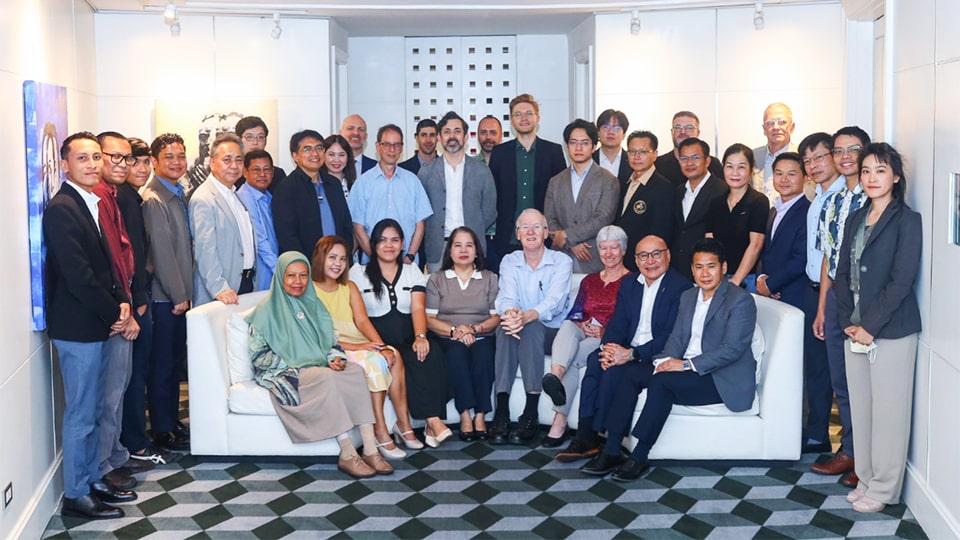 Participants represented governments, universities, research institutions, and international development organizations.
Participants represented governments, universities, research institutions, and international development organizations.
"We need to make those farming changes now—because becoming good ancestors takes commitment," said Ms. Trish Ranstead of New Zealand's Ministry for Primary Industries (NZ MPI), stressing the urgency of low-emission interventions and coordinated investment.
A keynote message from FAO's Scott Newman, delivered by Mr. Felix Teillard, reinforced the importance of scalable, science-based solutions for livestock GHG mitigation.
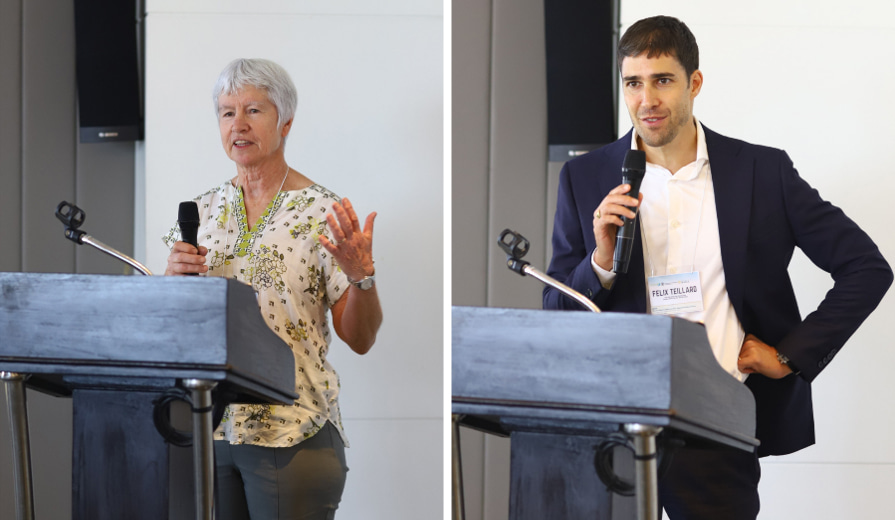 Ms. Trish Ranstead (left) and Mr. Felix Teillard (right) delivered opening remarks, highlighting the need for regional collaboration and timely climate action.
Ms. Trish Ranstead (left) and Mr. Felix Teillard (right) delivered opening remarks, highlighting the need for regional collaboration and timely climate action.
On the forum's first day, participants discussed policy readiness, measurement challenges, and tailored mitigation strategies. Breakout groups identified key barriers such as fragmented data systems, limited technical capacity, and the need for region-specific innovations.
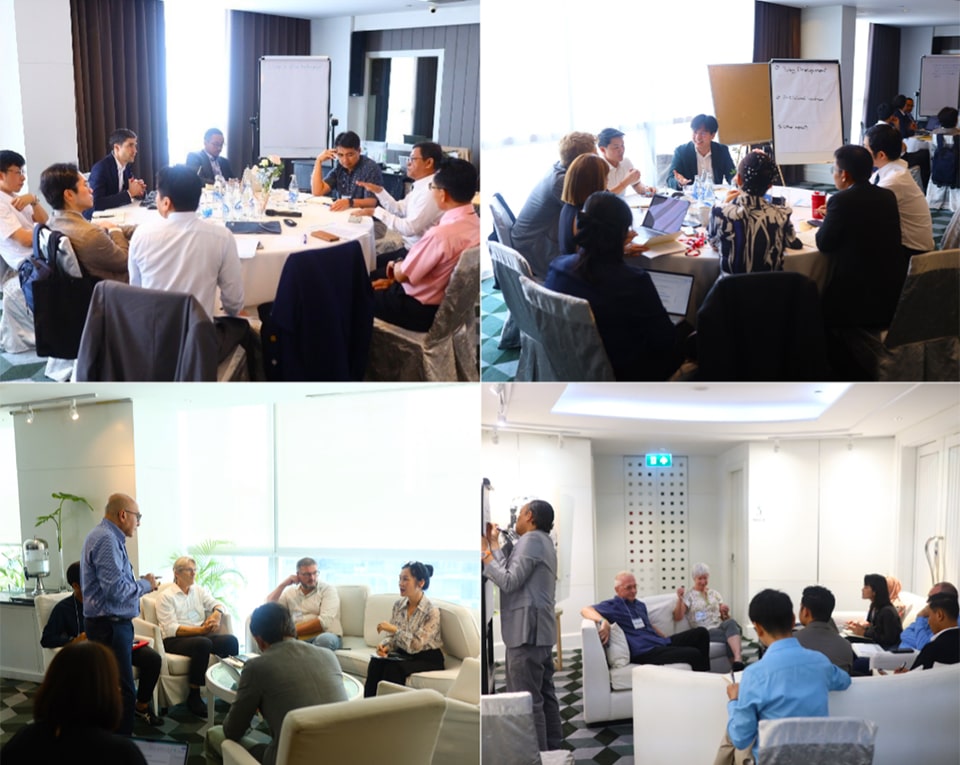 Forum participants engaged in breakout discussions to identify policy gaps and explore strategies for scaling livestock GHG mitigation.
Forum participants engaged in breakout discussions to identify policy gaps and explore strategies for scaling livestock GHG mitigation.
A scaling-up session featured examples from New Zealand and FAO, including feed optimization, breeding programs, and the "Cool Sheep" initiative—demonstrating how research can lead to real-world impact.
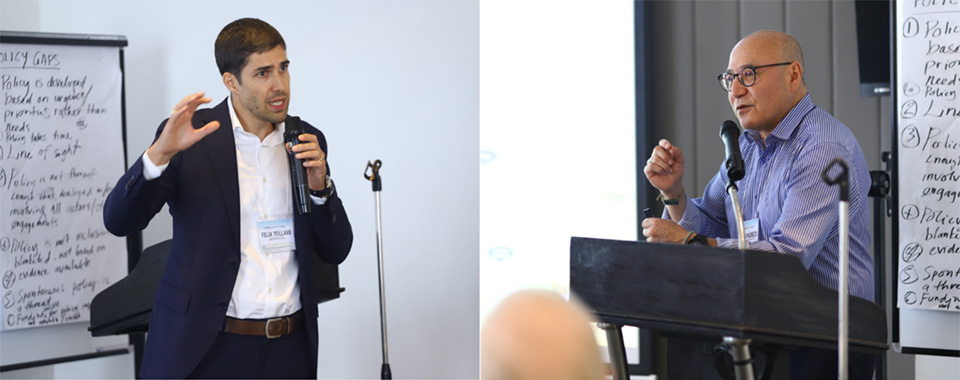 Mr. Felix Teillard (left) and Dr. David Pacheco (right) share global and regional innovations for scaling climate-smart livestock solutions.
Mr. Felix Teillard (left) and Dr. David Pacheco (right) share global and regional innovations for scaling climate-smart livestock solutions.
Brief presentations on the second day highlighted regional GHG-focused initiatives and their added value to country-level efforts. Dr. David Pacheco presented the New Zealand Climate Smart Agriculture Initiative in ASEAN, followed by Mr. Jisu Min on the Global Green Growth Institute's ASEAN-Korea Cooperation Program for Methane. FAO-RAP's Mr. Beau Damen outlined FAO's regional programs, while Dr. Kritapon Sommart of Khon Kaen University in Thailand introduced the Lancang-Mekong Dairy Program.
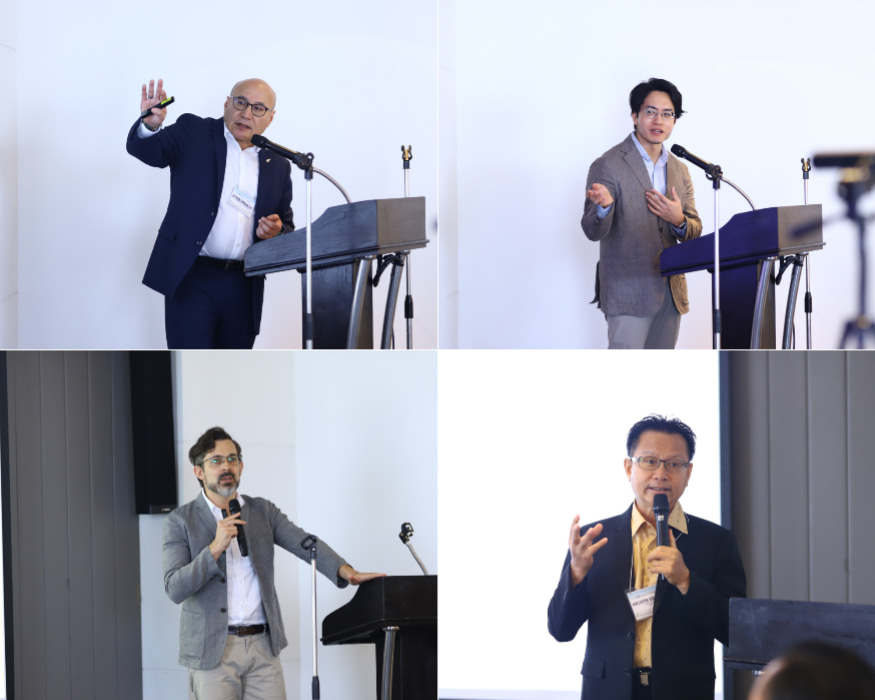 Clockwise from top left: Dr. David Pacheco, Mr. Jisu Min, Dr. Kritapon Sommart, and Mr. Beau Damen showcased regional programs supporting livestock GHG mitigation across Southeast Asia.
Clockwise from top left: Dr. David Pacheco, Mr. Jisu Min, Dr. Kritapon Sommart, and Mr. Beau Damen showcased regional programs supporting livestock GHG mitigation across Southeast Asia.
The latter part of the forum centered on aligning technical needs with investment opportunities. Representatives from various development partners—including Mr. Tsutomu Koyama from the Asian Development Bank (ADB), Mr. Ounheuan Saiyasith from the Australian Centre for International Agricultural Research (ACIAR), Dr. Atsuro Matsuda from the National Agriculture and Food Research Organization (NARO), and Dr. Nathan Borgford-Parnell from the Climate and Clean Air Coalition (CCAC)—shared funding strategies that support national climate priorities. A Q&A session explored how to blend science, local needs, and investment to scale results across Southeast Asia.
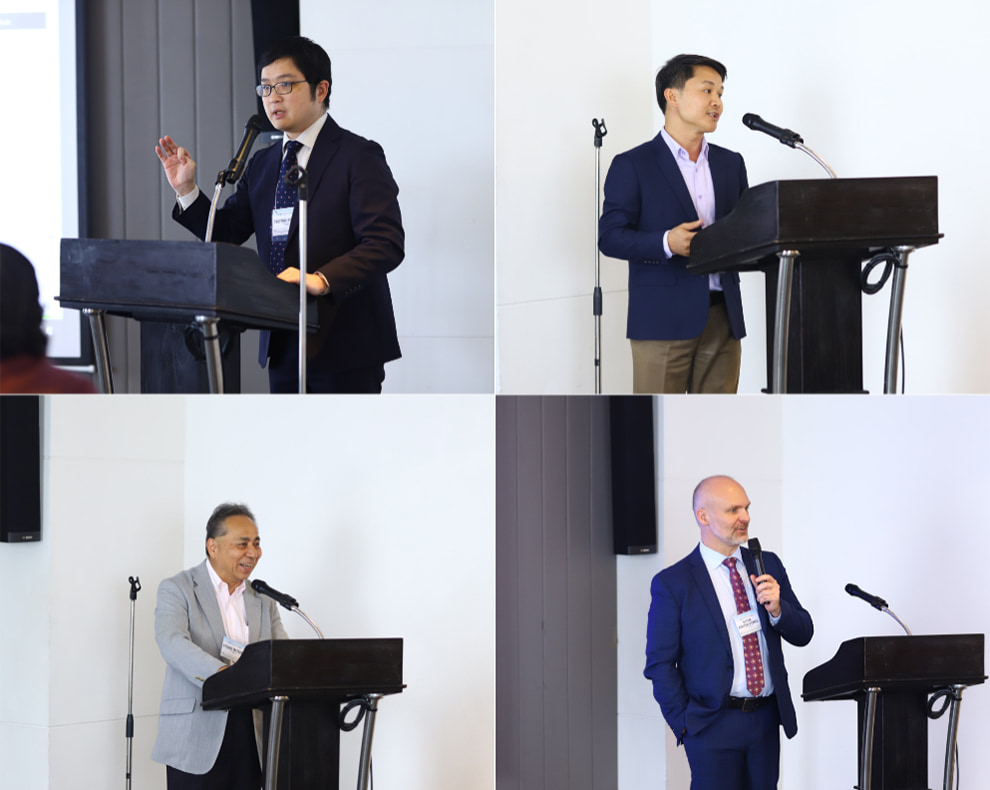 Clockwise from top left: Mr. Tsutomu Koyama, Mr. Ounheuan Saiyasith, Dr. Nathan Borgford-Parnell, and Dr. Atsuro Matsudaoutlined investment strategies supporting climate-aligned livestock initiatives in ASEAN countries.
Clockwise from top left: Mr. Tsutomu Koyama, Mr. Ounheuan Saiyasith, Dr. Nathan Borgford-Parnell, and Dr. Atsuro Matsudaoutlined investment strategies supporting climate-aligned livestock initiatives in ASEAN countries.
Dr. Roger Hegarty of NZGARC and Dr. Pacheco emphasized that effective communication and knowledge exchange were key to the forum's success. Dr. Pacheco noted the shared willingness among participants to collaborate as one of the workshop's most promising outcomes, adding, "Small, well-informed steps can unlock big transformation."
 From left: Dr. Roger Hegarty, Dr. Pacheco, and Dr. Andreas Wilkes, who led the discussions, share their insights on the forum’s outcomes and future directions.
From left: Dr. Roger Hegarty, Dr. Pacheco, and Dr. Andreas Wilkes, who led the discussions, share their insights on the forum’s outcomes and future directions.
Dr. Andreas Wilkes of NZAGRC mentioned the establishment of a regional Community of Practice (CoP), inspired by New Zealand's model, to sustain collaboration.
Participants revisited their written expectations from the forum's first dayand reaffirmed their commitment to regional cooperation.
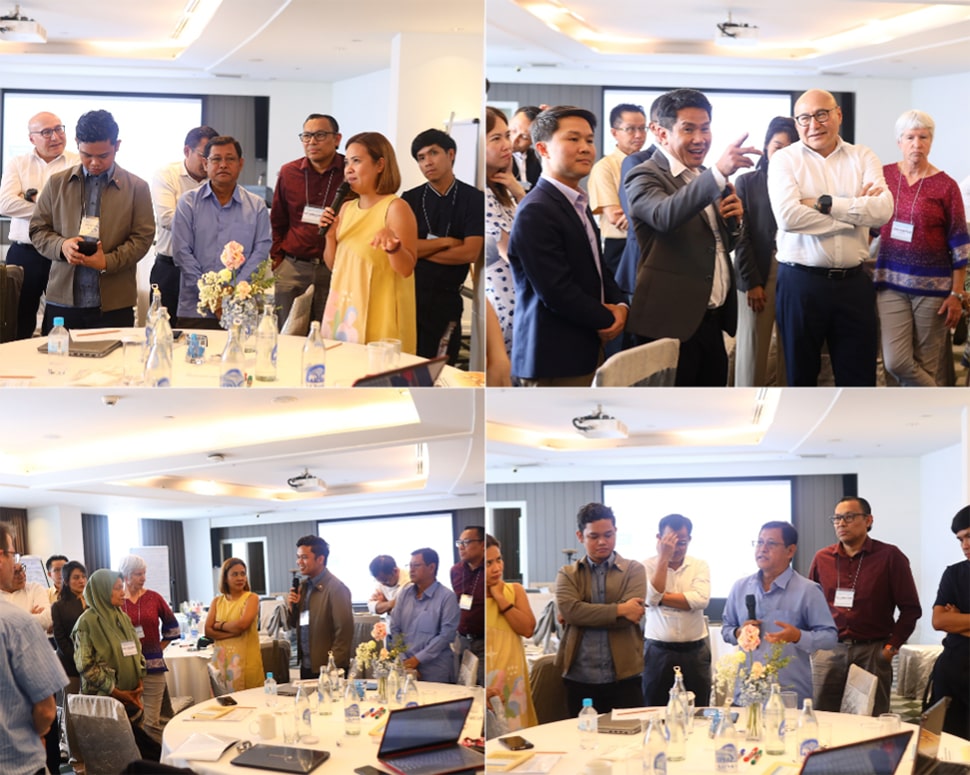 Clockwise from top left: Ms. Julienne Maria Undine Paz Quimio, University of the Philippines Los Baños, Philippines; Dr. Phanthavong Vongsamphanh, Department of Livestock and Fisheries, Lao PDR; Mr. Jacinth Paul Apostol, Climate Change Commission, Philippines;, and Dr. Mam Somony General Directorate of Animal Health and Production, Cambodia, shared reflections on key takeaways and reaffirmed their regional commitment to action.
Clockwise from top left: Ms. Julienne Maria Undine Paz Quimio, University of the Philippines Los Baños, Philippines; Dr. Phanthavong Vongsamphanh, Department of Livestock and Fisheries, Lao PDR; Mr. Jacinth Paul Apostol, Climate Change Commission, Philippines;, and Dr. Mam Somony General Directorate of Animal Health and Production, Cambodia, shared reflections on key takeaways and reaffirmed their regional commitment to action.
 Mr. Teillard of FAO-RAP and Ms. Ranstead of NZ MPI delivered closing remarks.
Mr. Teillard of FAO-RAP and Ms. Ranstead of NZ MPI delivered closing remarks.
The forum concluded with a united commitment to advance low-emission livestock development. This includes strengthening regional collaboration on emissions measurement, reporting systems, capacity building, and policy integration, while promoting the inclusion of livestock in national climate strategies and co-investment initiatives for a more sustainable agricultural future.